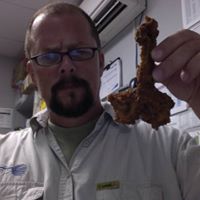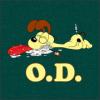Leaderboard
Popular Content
Showing content with the highest reputation on 02/04/2010 in all areas
-
My general advice to you would be to treat the patient and not the monitor. Imagine, if you will, that you were part of a BLS crew treating a SOB pt. Would you have treated the pvc's then. NO, of course not, because they were asymptomatic and so you would have had no notion of their presence. That list of yours will stand you in good stead, I was going to post on VT salvo's but you already have the heads up there. Relax, enjoy the ride and be good to your patient. Give them what they need, not what your cookbook says.... WM. PS the word is aneurysm.2 points
-
You can take my toe socks from my cold dead hands...1 point
-
I think somebody should just do that! Might they be respiratory and metabolic shock by some chance? I'm not being sargasmic here but seriously it wouldn't suprise me because they do not exist. Ask your instructor if for "metabolic" he is referring to hypoxemia caused by metabolic alkalosis and acidosis causing a shift in the oxyhaemaglobin dissassociation curve? This is also called the Bohr effect. If he gives you a glazed over look then that's your problem. Perhaps he is thinking of shock as hypoxia rather than hypoperfusion. If we do that then technically you can have "anemic shock" too! Not dissing you bro but the information you are given doesn't make a lot of sense and is poorly presented; which is a reflection I believe on your instructor and part of the problem of ambo's teaching ambo's. Would be nice to know if he has any formal adult education qualifications or perhaps a Masters in Prehospital Medicine like they do here or if he's just another ambo teaching ambo's. I can't find any ambo I know at ANY practice level who knows what "metabolic" or "respiratory" shock is and leads us to believe that your instructor lacks the pathophysiological knowledge of the shock process (confusing hypoxia over hypoperfusion) or is still teaching material from the seventies. To ask for "specific" vital signs that you may observe it also, in my view, a bit weird. As I said before the only way you will get a "specific" vital sign is to measure it, on that patient, at the time. Anything else is not "specific" and is generalised. A septic patient will be febrile, but we cannot say to what degree "specifically" because we have not measured his temperature, somebody with anaphylaxis will have hives or a rash however that is a specific symptom not a vital sign. I will be quite interested in seeing what your instructor has to say.1 point
-
I often come here for opinions and resources to compare to the endless noise I sometimes find when searching Google. I don't get what's so wrong with this thread? Dwayne Edited for grammar. No significant change in context.1 point
-
Bryan, The only thing we have remotely close to what you're looking for is our "Police Custody" protocol. I know it's not much, but here it is anyway. http://www.ncems.org/pdf/Pro14-PoliceCustody.pdf I hope you can get something out of it.1 point
-
Did you try Google? Here are a couple of links I found there. http://www.ottawa.ca/residents/health/support/professionals/cbnre/lacrimators/teargaspepperspray_en.html http://www.thepersonalsafetyguru.com/safety/550-treatment-for-pepper-spray-exposure/ And here's the other 338.998sites listed on your topic. Hope this helps!!1 point
-
Of course you would defend your profession, you are a medic student and therefore competing with a PHRN. However, a blanket statement like nurses belong in a hospital doesn't help your case. Have an argument but make sure it's a reasoned one. Maybe that's why nurses are paid and respected more No, strike that; it's unkind. I'm sorry. However, the point I am trying to make is that a paramedic does not have the god given right to pre-hospital care. There are other models that work just as well. WM Mark, Here is a copy of the presentation I gave in 2008 to the paramedic students at the Montgomery County Public Safety Education Campus in Conshohocken, PA. Here Don't hesitate to mail me if you want to know more.... WM PS: the cautionary tale mentioned at the end is1 point
-
Indeed. I like the idea of utilizing alternate referral pathways, but it will never work in the US. Below is one example of how they are used in the UK at ECP (MSc) level. http://www.paramedicpractitioner.com/downloads/WAS-ECP_Guidelines.pdf1 point
-
I think Docharris has your answer then brother. RN gets you more blood and guts, more respect, more interesting medicine and the better education for when you begin to think more about supporting a family than fulfilling your inner destiny, (Not making fun, being fulfilled is certainly important, 'specially when you're young, but it won't always be your priority.) I'm sorry we couldn't give you better news, but truly, when you look back at the world from an RN's job, money, and opportunities you may be grateful you were forced off of the EMT path. Dwayne1 point
-
Whilst I have no objection to the creation of a Batchelor's qualification for EMS personnel, I do wonder why it's necessary to abolish the PHRN. PHRN's do have a role in EMS, albeit a different one in the US. Here in the Netherlands we are all RN's in EMS. We are not in some kind of Utopia because we have our issues too (pay and retirement benefits being just an example). However because we hail from a far older profession we are accepted as fully paid up members of the healthcare team. Autonomy to practice is essential to the development of any profession. How do you acheive that? By education. One of the nice things about my job is the fact that we aren't just looking to transport but arranging the most appropriate care pathway for our patient. Taking the elderly and/or vulnerable into a hospital ER teeming with all sorts of bacteria isn't always the right thing to do. However, in order to acheive this, I need to have a good system of primary care that can be relied upon to look after my patient after I've left. In order to do that those patients need to be insured for healthcare. Which is why it disappoints me to see that the US healthcare reforms are looking likely to strand. Sorry for making this a little political, but my point is that in order to modernize EMS (at least in the US) factors outside of EMS' sphere of influence also need to be adressed. WM1 point
-
I'm preparing for deployment with our medical assistance team into the Port au Prince area. Anyone want me to be on the look out for friends and family? I deploy Friday unless plans change.1 point
-
Sorry Jaime, I was having a discussion with Lisa regarding the antics of some on here. Your input is welcome though, so long as you keep it civil. If you had wanted the thread to form some sort of position, you might want to consider posting more than a simple link to a news story rather than respond with attitude to a response which empathises with the officer. To me, Lisa's comment was in complete association to the news story you posted as she expressed her understanding, if even in a small way, of how that officer felt. So, why did you post the article without a comment to give direction to the thread? To bring attention to the fact someone appreciated the efforts of the paramedics? To bring attention to the fact that these medics acted selflessly? To bring attention to the fact that it was a dangerous act and they risked themselves? There are any number of ways this thread could have gone after you started it. If you don't want people making particular comments in a thread you started, then put some effort in rather than a simple cut and paste and make an actual comment.1 point
-
I didn't think you were, but there are those on here who just feel the need to compensate for their own inadequacies and demean their peers to elevate their own status in their eyes. It is really too bad.1 point
-
What are you saying Syphilis? That Lisa's appreciation of the people who cared for her is not so sincere as that of Cst. Czapnik because her medical emergency wasn't quite as severe? That is how I interpret your comment. All she is stating is that she appreciated the efforts of the paramedics who treated her and can empathize with the appreciation that this officer felt. There are enough medics out there who bitch and moan that ours is a thankless job, it doesn't help matters when our peers belittle those who express their appreciation for a job well done.1 point
-
I’m looking for some data for a research paper I’m doing for my Advanced Care Paramedic course. I’m looking for protocols, operating procedures/guidelines, etc... on OC/pepper spray calls for service. We’ve seen a huge spike with the gang bangers in our fine city using pepper spray against innocents and even law enforcement officers. Looking to find a better way of dealing with these patients. Would prefer not to transport as we have a problem with off load delays and a lack of resource issue here too. Any help you can send my way it would be appreciated. Would prefer links, Word or PDF documents. Please feel free to forward my request to those you think may be able to assist. Thanks, Bryan0 points
-
A holistic approach is addressing a patient's needs, medically, mentally, and socially. I wasn't saying that you doubt that I am a caring professional. Yes, there are those in EMS that ignore the needs of a patient beyond the medical. But you can't tell me that there aren't those in nursing who do the same. Just because you are educated in something or taught to do something doesn't mean you do it. However, in the pre-hospital setting, you are limited as to what needs you can meet because you're only with the patient for a short amount of time. I know medics who have let dogs out, locked doors, changed a baby's diaper, etc. Yes, holding someone's hand is hardly the definition of a holistic approach, but it's more than some paramedics and nurses do.0 points
-
Proving yet again you all are behind the times up there!-1 points
-
Just because one is a paramedic, doesn't mean one isn't a cocky jackass who wouldn't crap the bed on a call-1 points
-
Well said. Not sure who Jaime is, but ok. The context of this post I assume is directed towards the original poster, which was me. Thanks for the input, I'll form my posts more to your liking next time. I am after all giving your opinions ... I originally made the post to share the information I had read; a simple story of a horribly sad incident. I was rather speechless (rarely happens), and the story almost brought tears to my eyes. Does that explain my "lack of effort" as you put it? A brother of ours had the strength in his DYING moments to say thank you to 4 of his own. Unfortunately some people didn't read the story in its entirety, and the posting just went off in a completely different direction. You I'm sure have started/been a part of similar threads that meander. Please take your own advice and keep things civil when in a main forum. If you want to blab at me in private message go right ahead, I really don't care. I don't want to read through useless bickering in a forum, and I'm sure others don't either. As for posting somewhere here, I will do so where I please as this is an open site and don't need an invitation to do so. Neither do you. I'm going to consider this matter-1 points
-
The hospital ships could really be a great help for the patients on the Haiti. This could lessen the burden that the disaster had done. Anyway help from other countries would be a great help.-1 points
-
A nurse might take the attitude that a paramedic doesn't have a god-given right to pre-hospital care, but one could flip it around and say that a nurse doesn't have a god-given right to hospital care. One could also say that paramedics may not have a god-given right to pre-hospital care, but neither do nurses, especially since there are interventions that paramedics can perform but nurses can't (unless they're a PHRN). It's convenient that nurses have been given a way to function in a paramedic role, but there is no such bridge for paramedics without becoming nurses. As far as a reasoned argument goes, what's yours? What is the rationale for a PHRN in the United States other than putting paramedics out of work?-1 points
-
Better educated? That's what critical care medic would be for. Better at a holistic approach to medicine? I'll have you know that yesterday I transported a terminal cancer patient to comfort care who was sedated and, just like his daughter asked, I held his hand the whole way just so he would know somebody was there. I never lie to my patients or their families and I keep their promises. I do everything in my power to make them comfortable. Why? Because it's my job. Better at communicating with patients? I've gone on two and a half hour transports and talked with the patient the whole way, laughing, telling stories, etc. What would a paramedic know about cytostatic regimes? Plenty if they were taught about them. As far as paramedics working in the hospital setting as "ER techs", you mean "go for"s and CNA replacements? Because that's all they seem to amount to over here in the states aside from the rare hospital that might let them get a little close to their scope of practice... let them put a little IV in to keep them happy and keep them from thinking they're a slave for grunt work. My simple argument is that there is no need for pre-hospital registered nurses, or at least there wouldn't be if some places bothered to educate their paramedics.-1 points






